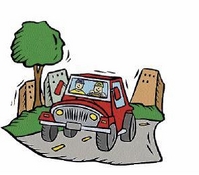Driving for the other driver
Published: Sunday | December 13, 2009

The importance of defensive driving cannot be understated and should be noted by all motorists.
"By observing the laws, using good judgement, restraint and applying the principles and practices of defensive driving, you may reduce the possibility of an accident," says Superintendent Radcliffe Lewis, head of the Police Traffic Division."
"By placing a few important rules in their minds, drivers can get out of a potentially disastrous situation and reduce careless driving to almost zero," he adds.
Dr Hame Persaud believes body and mind should be in tip-top condition.
"Motorists should be drug-free and stress-free," said Dr Persaud. He feels motorists should have a medical check-up at least once yearly and get adequate rest before getting behind the steering wheel.
Tips
1. Avoid head-on collision. A pair of automobiles colliding at 50mph each would provide the same impact as if one slammed into a brick wall at 100mph. Head-on crashes oftentimes take lives.
2. Do not give up if you lose control. Some accidents could have been avoided if the drivers involved had not given up easily. Remember that a skid can easily be corrected by steering the vehicle in the direction the vehicle is skidding. If you are carrying a heavy load in the rear seat or the trunk, your car may tend to oversteer at high speeds or on slippery pavements.
3. Brake failure. "The seriousness of brake failure depends on where it occurs. If you lose your brakes on a steep hill, you are in big trouble," says mechanic Anthony Brown. According to him, the driver should use the emergency brake while pumping the pedal vigorously to see if some stopping action can be accomplished.
3. No showboating. Resist the temptation to speed around corners in order to hear your tyres scream in protest. It is a dangerous way to get attention.
4. Use both hands to drive. A good driver keeps both hands on the steering wheel.
5. Avoid road rage. Remain calm and in control at all times.
6. Exercise road manners. Extend courtesies such as, "Please", "Thank you" and "I'm sorry", as the need arises.
- Paul Messam
